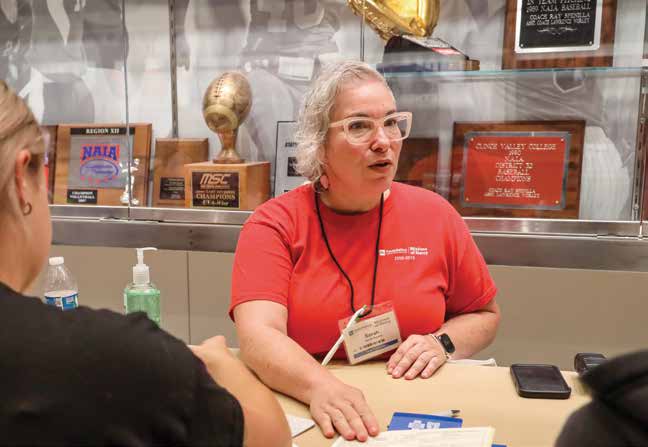Fall 2023
Getting to the root of oral health
Sarah Raskin facilitates oral health access for underserved patients and dental workforce equity for underrepresented professionals
BY DAVID S LIPHER
When the subject of preventative healthcare is broached, oral health is often regarded as a distinct and separate issue. However, for Sarah E. Raskin, Ph.D, M.P.H., associate professor at the Wilder School, this is not the case. Raskin sees a deep and intimate connection between oral health and overall well-being. Bridging the gap between these two aspects of health is her passion, and she has dedicated herself to finding solutions to disparities in oral care. Through her work, she’s making a significant impact in areas such as dental safety nets, workforce diversification, communitybased research and rural oral health. “Oral health has a reciprocal relationship with overall health. For example, pregnant people who have periodontal (gum) disease are more likely to deliver preterm or low birth weight babies,” said Raskin. “Having gum disease also substantially increases the risk of poor glycaemic control and end-stage renal disease among people with diabetes.” Much of Raskin’s research critiques the status quo and historical deficiencies in oral healthcare, especially systemic factors that wind up excluding racial and ethnic minorities, and economically disadvantaged individuals from obtaining care and from pursuing opportunities in the dental professions. To understand these inequities, she’s taking a holistic view of oral health systems and incorporating her training in cultural anthropology into her approach. One constant has emerged — many of the same factors that exclude underserved patients from dental care also prohibit professional achievement among potential dental workforce members. “Using mixed social science methods such as patient and provider surveys, interviews with oral health policy advocates, and ethnographic observations of service delivery, we can go beyond strict biological understandings of oral disease and cognitive understandings of career paths,” she said. “These underlying forces shape inequities such as societal expectations of what a dentist should look like and how a community member should tolerate being excluded from care.” Community partnerships are key to Raskin’s work, and as a VCU School of Dentistry faculty affiliate and member of the iCubed Initiative Oral Health Core, she’s using her expertise to influence best practices to incorporate outreach as a prime component for transforming dental service delivery. She’s partnering respectively at the local, state, and national levels with CrossOver Healthcare Ministry, Virginia Health Catalyst, and CareQuest Institute for Oral Health. Together with these groups, she has worked to reduce missed appointments among dental safety net patients, expand community-based services through dental practice law changes, and document and address how discrimination within dental offices affects patient outcomes. Her data-driven research, which she makes publicly accessible by publishing in an open-access format as much as possible, represents a sea-change for reframing the conversation around oral health. Through her recognized expertise, connections, and influence on oral health advocates, educators, and scholars, her mission is to make oral health a permanent part of the larger discussion for health equity in all policy planning.

BY THE NUMBERS
- As of 2022, of all practicing U.S. dentists, only 5.9% are Hispanic and 3.8% are Black, compared to 19.1% and 13.6%, respectively, of the U.S. population. Source: American Dental Association and U.S. Census Bureau
- Nationally, people who identify as experiencing discrimination or indigent treatment in a dental setting are two to four times more likely to:
- describe their oral health as poor/fair
- not to have had dental care in two years
- are not planning a future visit for preventive/routine oral care, as in the dental setting.
Source: Sarah Raskin research under publication review
- Only 33% of dentists nationwide treat Medicaidinsured dental patients. Dentists who treat Medicaid-insured patients are more likely to be Black, Hispanic, or Asian and more often practice in rural areas, majority nonwhite zip codes or high-poverty zip codes. Source: Nasseh K, Fosse C, Vujicic M. Medical Care Research and Review.
Fall 2023 / In this issue
- Letter from the dean's office
- Visionary Leadership: A Q&A with RaJade M. Berry-James
- 2023 Deans Summit on Public Service Education
- Commonwealth Poll
- Q&A: Governor’s Voice
- Sarah Raskin facilitates oral health
- Meet our new faculty
- Sesha Joi Moon: Why I give
- Alumna Amy Atkins serves commonwealth families
- Taking the Capitol steps to career success
- Accomplishments and achievements
- Alumna Najmah Thomas merges history, equity and policy